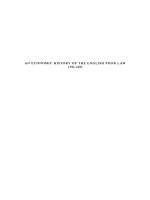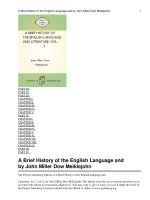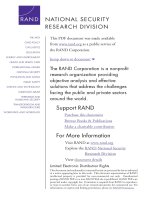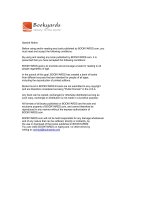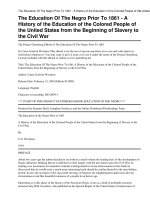A history of the english speaking peoples since 1900
Bạn đang xem bản rút gọn của tài liệu. Xem và tải ngay bản đầy đủ của tài liệu tại đây (14.31 MB, 770 trang )
A HISTORY
OF THE
ENGLISHSPEAKING
PEOPLES
S WCLéà
M
ROBERTS
Tai Lieu Chat Luong
$35.00
"Andrew Roberts has justly made a reputation for himself as
one of today's leading young British historians."
—Alistair Home, Wall Street Journal
I
n 1900, where Churchill ended the fourth volume of his History of the English-Speaking Peoples, the United States had
not yet emerged onto the world scene as a great power. Meanwhile, the British Empire was in decline but did not yet know
it. Any number of other powers might have won primacy in
the twentieth century and beyond, including Germany, Russia,
possibly even France. Yet the coming century was to belong
to the English-speaking peoples, who successively and successfully fought the Kaiser's Germany, Axis aggression and Soviet
Communism, and who are now struggling against Islamic fundamentalist terrorism.
Andrew Roberts brilliantly reveals what made the Englishspeaking people the preeminent political culture since 1900,
and how they have defended their primacy from the many assaults upon them. What connects those countries where the
majority of the population speaks English as a first language—
the United States, Great Britain, Canada, Australia, New Zealand, the West Indies and Ireland—is far greater than what separates them, and the development of their history since 1900
has been a phenomenal success story.
Authoritative and engrossing, A History of the EnglishSpeaking Peoples Since 1900 is an enthralling account of the
century in which the political culture of one linguistic worldgrouping comprehensively triumphed over all others. Roberts's
History proves especially invaluable as the United States today
looks to other parts of the English-speaking world as its best,
closest and most dependable allies.
0207
ANDREW ROBERTS is the author of Napoleon and Wellington, Eminent Churchillians and Waterloo. His writing appears
regularly in The Sunday Telegraph. He lives in London. His
website can be found at www.andrew-roberts.net.
Jacket design by Roberto de Vicq de Cumptich
Front photograph © Matty Zimmerman/Associated Press
Back photograph © Corbis
Author photograph © Bolla Denehy
Visit www.AuthorTracker.com for exclusive
information on your favorite HarperCollins authors.
HàrperCollinsPublisbers
www.harpercollins.com
ADVANCE PRAISE FC3R ANDREW ROBERTS'S
A HISTORY OF THE ENGLISH-SPEAKING
PEOPLES SINCE 1900
"Thought-provoking, erudite and opinionated in the best sense of the term, Andrew Roberts
boldly picks up where Winston Churchill left off and provides a sweeping history of the
great struggles of the last century. Always unabashed and interesting, Roberts is one of
Britain's most talented young historians, and in these pages, American readers will delight
in discovering him."
—Jay Winik, author of April 1865
"Engaging, entertaining and opinionated, Andrew Roberts's new book is a brisk tour through
the epic years of the twentieth century. Churchill would have approved of Roberts's style,
which is anything but bland. Readers will find much to think about in these pages."
—Jon Meacham, author of Franklin and Winston
"With passion and scholarship, Andrew Roberts embraces the faith of Winston Churchill
that the English-speaking peoples are 'the last best hope of mankind.' He has Churchillian
courage. He marches vigorously into minefields of controversy, marshaling his evidence and
his sequences with great skill. Throughout he is cogent in argument and lucid in his prose.
Here is a history that is as timely as it is valuable."
—Harold Evans, author of The American Century
"The so-called special relationship between the United States, Canada, Australia, New Zealand and the United Kingdom is alive and well in this elegantly written interpretive history.
By focusing on why English has become the dominant language in the world, British historian Andrew Roberts shines a fresh light on today's geopolitical realities. A truly smart and
important book."
—Douglas Brinkley, author of The Great Deluge
ISBN 978-0-06-087598-5
53500
A History of the
English-Speaking Peoples
Since 1900
By the same author
'The Holy Fox': A Life of Lord Halifax
Eminent Churchillians
The Aachen Memorandum
Salisbury: Victorian Titan
Napoleon and Wellington
Hitler and Churchill
What Might Have Been (editor)
Waterloo
A History of the
English-Speaking Peoples
Since 1900
ANDREW ROBERTS
YlarperCollinsPublishers
A HISTORY OF THE ENGLISH-SPEAKING PEOPLES SINCE IầJOO. Copyright â 2OO7
by Andrew Roberts. All rights reserved. Printed in the United States of America. No
part of this book may be used or reproduced in any manner whatsoever without written
permission except in the case of brief quotations embodied in critical articles and reviews.
For information address HarperCollins Publishers, 10 East 53rd Street, New York, NY
10022.
HarperCollins books may be purchased for educational, business, or sales promotional use. For information please write: Special Markets Department, HarperCollins
Publishers, 10 East 53rd Street, New York, NY 10022.
First published in Great Britain in 2006 by Weidenfeld & Nicolson.
Library of Congress Cataloging-in-Publication Data
Roberts, Andrew, 1963A history of the English-speaking peoples since 1900 / Andrew Roberts.—1st ed.
p. cm.
Continues Winston Churchill's A history of the English-speaking peoples.
Includes bibliographical references and index.
ISBN: 978-0-06-087598-5
ISBN-IO: 0-06-087598-4
1. Great Britain—History—20th century. 2 . Commonwealth countries—
History—20th century. 3. English-speaking countries—History—20th century.
DA 16 .R46 2007
909/.097521081 2 2
2006050123
07 08 09 10 11
•/RRD
1 0 9 8 7 6 5 4
To Leonie Frieda
CONTENTS
List of Illustrations
Acknowledgements
INTRODUCTION
ONE
TWO
THREE
FOUR
FIVE
six
SEVEN
EIGHT
NINE
TEN
ELEVEN
TWELVE
THIRTEEN
FOURTEEN
FIFTEEN
SIXTEEN
A Portrait of the English-Speaking Peoples at the
Dawn of the Twentieth Century
Shouldering'The White Man's Burden': 1900-4
America Arrives: 1905-14
The First Assault: Prussian Militarism 1914-17
Peace Guilt: 1918-19
American Energy: 1920-9
Capitalism at Bay: 1929-31
The Second Assault: Fascist Aggression 1931-9
Divided and Faltering: 1939-41
United and Conquering: 1942-4
Normandy to Nagasaki: 1944-5
The Third Assault: Soviet Communism 1945-9
Cold War Perils: The 1950s
Civis Americanus Sum: The 1960s
The Long, Dismal, Drawling Tides: The 1970s
Attritional Victory: The 1980s
The Wasted Breathing Space: 1990 - 11 September
ix
xi
i
18
55
87
136
165
192
211
253
299
334
380
410
447
486
523
561
2001
SEVENTEEN
The Fourth Assault: Islamicist Terrorism and its De 599
Facto Allies: 11 September 2001 - 15 December 2005
CONCLUSION
634
Notes
Maps
Bibliography
Index
649
666
668
693
LIST OF ILLUSTRATIONS
Between pages 242 and 243
Queen Victoria visits Dublin, April 19001
Italian immigrants on Ellis Island, New York, 20052
Richard Seddon, founder of modern New Zealand2
Kaiser Wilhelm II and his generals prepare for war3
Anzac Cove, Gallipoli, April 1915 4
The sinking of the Lusitania, May 1915 3
Men of the British West Indies Regiment during the Somme offensive,
Septemebr 19165
Treaty of Versailles, 28 June 19192
The Empire State building, New York3
The Hoover Dam2
The British Empire goes to war, 19393
British troops surrender to the Japanese in Singapore, February 1942 2
The Canadian disaster at Dieppe, August 1942 6
The Quebec Conference, August 19433
Between pages 498 and 499
Dresden, before and after the Allied bombing raids of February 1945 7 & 8
Celebrating the death of Adolf Hitler, May 19452
Discoveries and an invention: Alexander Fleming (penicillin), John Logie
Baird (television) and Jonas Salk (polio vaccine) 3
The removal of Queen Victoria's statue from the Dublin parliament, 19489
The destruction of the Nelson pillar, Dublin, March 19662
Edmund Hillary, the conqueror of Everest7
The first moon landing, July 196910
The resignation of the US President, Richard Nixon, August 1974"
The American evacuation of Saigon, April 197512
The end of Soviet communism, 199112
Saddam Hussein quits Baghdad, April 200312
The aftermath of 9/11 "
X
LIST OF ILLUSTRATIONS
The author and publishers thank the following for permission to reproduce
the illustrations in this book:
'Illustrate London News Picture Library
Getty Images
3
Bridgeman Art Library
4
Bridgeman Art Library (Imperial War Museum)
5
Imperial War Museum
6
Weidenfeld and Nicholson Archive
7
Topforo
8
AKG London
9
G.A. Duncan Photographs
IO
NASA
11
Getty Images (Time/Life)
12
REX Features
2
ACKNOWLEDGEMENTS
This book is emphatically not intended to be a comprehensive history of the Englishspeaking peoples, which would be impossible to write in one volume and anyhow probably
rather dull to read. Instead of a textbook, this is a series of snapshots taken rather arbitrarily,
episodically and idiosyncratically from the life of the English-speaking peoples since the
dawn of the twentieth century, through whose shared experience I believe certain common
themes emerge, almost unbidden.
For my purposes, the English-speaking peoples hail from those places where the majority
of people speak English as their first language: the United States, the United Kingdom and
her dependencies, Canada, Australia, New Zealand, the British West Indies and Ireland.
The English diaspora has of course extended far further, such as to South Africa, Rhodesia
(present-day Zimbabwe), Singapore, Hong Kong, and so forth, but I have confined myself
to the places where the English language is spoken by the numerical majority as their first
language today.
D-Day saw the supreme expression of the English-speaking peoples working together
for the good of Civilisation, and I should like to thank the irrepressible Paul Woodadge of
Battlebus Tours for conducting me on battlefield tours of Omaha beach, Beuzeville-auPlain, La Fière, Utah beach, Les Mézières, Sainte-Marie-du-Mont, Bréville, Angoville-auPlain, Merville Battery, Strongpoint Hillman, Sword beach, Pegasus Bridge, Juno beach,
Sainte Mère Eglise, Lion-sur-Mer, Gold beach and Crépon, as well as to the Ryes Commonwealth War Cemetery at Bazenville and the Normandy American Cemetery at Colleville-sur-Mer. Paul's encyclopaedic knowledge of Normandy in 1944 has been invaluable
in offering me insights into the campaign that represents the greatest single service made
by the English-speaking peoples to the cause of Freedom.
My thanks also go to Mrs Esin Oktar for conducting me around several battlefields and
cemeteries of the Gallipoli campaign, including Anzac Cove, ' V Beach, The Nek, Lone
Pine, Plugges's Plateau and Chunuk Bair, as well as the Kabatepe Museum. My understanding of that campaign has also benefited greatly from my contact with Prof. Ian Beckett
of Northampton University, whom I should also like to thank.
This book has benefited from my conversations with people interested in the subject,
and I would particularly like to thank the following for their thoughts, ideas and help: Carol
Adelman, Rupert Allason, Joan Bright Astley, Jed Babbin, John Barnes, Michael Barone,
Prof. Ian Beckett, Alan Bell, James C. Bennett, Mrs Benazir Bhutto, Robin Birley, Lord
Black, Geoffrey Blainey, Philip Bobbitt, John Bolton, Sen. George Brandeis, Jung Chang
and Jon Halliday, Robert Conquest, Alistair Cooke, Sir Zelman Cowen, Peter Day, Prof.
David Dilks, Prof. Clement H. Dodd, Alexander Downer, Douglas Feith, Prof. Niall
Ferguson, Alan Forward, Sir Martin Gilbert, Hon. Newt Gingrich, Dean Godson, Michael
Xll
ACKNOWLEDGEMENTS
Gove, Tom Gross, Katherine Harris, Simon Heffer, Prof. Peter Hennessy, Peter and
Caroline Hopkins, Sir Alistair Home, Prof. Sir Michael Howard, Colonel John HughesWilson, General Sir Michael Jackson, Frank Johnson, Paul Johnson, General John K. Keane,
Alan H. Kessel, Roger Kimball, Prof. Mervyn King, Dr Henry Kissinger, Irving Kristol,
Lord Lambton, Lord Lamont, Richard Langworth, Bernard Lewis, Andrew Lownie, Hugh
Lunghi, Kim McArthur, Sen. John McCain, John McCormack, Prof. Kenneth Minogue,
John Montgomery, M. Ergiin Olgun, John O'Sullivan, Allen Packwood, Stephen Parker,
Hay den B. Peake, Richard Perle, Melanie Phillips, General Colin Powell, Lord Powell,
David Pryce-Jones, James and Géorgie Riley, Tony Ring, Patrick Robertson, Kenneth
Rose, Donald Rumsfeld, Colin Russel, Mr Justice Antonin Scalia, Prof. Roger Scruton,
Simon Sebag Montefiore, Victor Sebastyen, William Shawcross, James E. Shiele, Dr John
Silber, Sen. Gordon H. Smith, Anthony Staunton, Irwin and Cita Stelzer, David Tang,
Lady Thatcher, Chang Tsong-zung, Patrick Tyler, Prof. Claudio Véliz, Prof. Donald
Cameron Watt, Lord Weidenfeld, the late Caspar Weinberger, David Wills, Keith Windschuttle, James Woolsey and Sir Peregrine Worsthorne.
Mr Ian Sayer has kindly allowed me privileged access to his Second World War archive
of 60,000 unpublished documents, the largest such collection in private hands, and I would
like to thank him for permission to quote from several of them.
This book has necessarily involved much archival research in some far-flung parts of the
world, and I should like to thank the following people, in no particular order, for making
that such an enjoyable experience over the past four years: Darrah McElroy at the (British)
National Archives; Martin Collett of the Auckland War Memorial Museum Library; Jeff
Flannery of the Department of Manuscripts in the Library of Congress in Washington;
Campbell Bairstow of Trinity College, Melbourne; John Stinson of the Manuscripts
Department of the New York Public Library; Allen Packwood, Director of the Churchill
Archive Centre in Cambridge; the staff of the London Library and British Library; Fiona
Kilby at the National Library of Australia in Canberra; Lara Webb of the library of the
Royal Society of Arts; Sheila Markham of Brooks's Club library; the Librarian of the
Knickerbocker Club, New York; Jenny Whaley of the Auckland City Library; Philip Reed,
Director of the Cabinet War Rooms in London; Geoffrey Browne of the University of
Melbourne; Sir John Lucas-Tooth, secretary of the Beefsteak Club; Colin Harris of the
Bodleian Library Modern Manuscripts Room, Claire Scott of Christchurch City Library;
Sean Noel of the Howard Gotlieb Archival Research Center, Boston University; Richard
Palmer of the Lambeth Palace Library; Godfrey Waller, Superintendent of the Manuscript
Reading Room at the Cambridge University Library; Janusz Janik of the State Library of
Victoria in Melbourne; David Bell of the National Archives of Australia in Canberra; James
Guest for my tour of the Victoria State Parliament; Peter Tuziak for my tour of the New
South Wales State Parliament; Christina Young for my tour of the New Zealand Parliament;
and the guides for my tours of the Old Parliament Building and the Australian Parliament
in Canberra; Neil Porter at the Northern Ireland Assembly at Stormont; the librarian of
the Metropolitan Club, Washington; Tim Lovell-Smith of the Alexander Turnbull Library
of the National Library of New Zealand; Suzanne Mallon of the Mitchell-Dixon building
of the State Library of New South Wales; Prof. Mark Francis of the University of
Christchurch, and Heidi Kuglin of the Archives of New Zealand in Christchurch.
Characteristically generous have been my aunt and uncle, David and Susan Rowlands,
for lending me their beautiful farmhouse in the Dordogne for five weeks in the summer of
2005, during which much of this book was written.
ACKNOWLEDGEMENTS
Xlll
A large number of people have read parts of my manuscript for me and offered suggestions, and I would like to thank John Barnes, Prof. Paul Bew, Lord Black, Con Coughlin,
Carlo D'Esté, Jonathan Foreman, Susan Gilchrist, Dean Godson, Tom Gross, Frank
Johnson, Lord Lamont, Patrick Maume, John McCormack, Simon Sebag Montefiore,
Douglas Murray, Tim Newark, Lucy Pawle, David Pryce-Jones, William Shawcross, Andy
Smith, Prof. Fred Smoler, Irwin Stelzer, Prof. Claudio Véliz, Lord Weidenfeld, David Wills,
Keith Windschuttle, Paul Woodadge and Peter Wyllie. Eric Petersen, Roger Jenkin, Stephen
Parker and my father Simon Roberts each read the entire manuscript, and I would like
specially to acknowledge their invaluable help.
My fiancée, Susan Gilchrist, has helped with this book in a myriad of ways, principally
through her ceaseless encouragement, and I cannot thank her enough. My editor Ion
Trewin, literary agent Georgina Capel and copy-editor Linda Osband could not have been
kinder and more enjoyable to work with.
This book is dedicated to Leonie Frieda, in recognition of our half-decade special
relationship.
Andrew Roberts
www, andre w-roberts. net
January 2006
Dubliners loyally greeting their beloved Queen-Empress Victoria on her visit
to Ireland, April 1900
A group of Italian immigrants about to join the melting pot
waiting in a hall on Ellis Island, New York, 1905
Richard Seddon, founder of modern New Zealand
The first great assault on the English-speaking peoples since 1900; Prussian Militarism
as personified by Paul von Hindenburg, Kaiser Wilhelm II and Erich von Ludendorff
The opposed landing at Anzac Cove on the Gallipoli Peninsula
on the morning of 25 April 1915
A children's jigsaw puzzle featuring the torpedoing of the unarmed American liner
Lusitania by a German U-boat on 7 May 1915, in which 1,198 people died
Men of the British West Indies Regiment in camp on the Albert-Amiens Road
during the Somme Offensive of September 1916. By mid-1916 the 3rd and
4th battalions had volunteered for service on the Western Front
Allied officers outside the Hall of Mirrors watching the signing of the
(on balance, rather reasonable) Treaty of Versailles, 28 June 1919
One of the engineering
wonders of the Englishspeaking world: the
Empire State building,
built between 1929
and 1931
Imperial Pride: the British Empire marches forth in a 1939 recruitment poster





